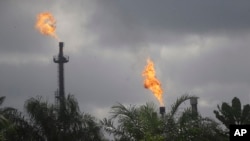With rising oil prices, Nigeria is cracking down on oil theft as part of the country's effort to recover missed revenue. Nigeria loses some 150,000 barrels of oil a day to illegal tapping of pipelines. At that rate, authorities say the country loses about $4 billion every year, or 10 percent of its annual budget.
Nigerian Upstream Petroleum Regulatory Commission head Gbenga Komolafe announced the revenue-recovery effort this week but declined to provide further details on new steps authorities would take.
Gbenga said President Muhammadu Buhari approved the "Industry-Wide Oil Revenue Recovery Initiative" and formed a committee that includes several security agencies. He said the committee will begin operations soon.
"The positive impact of that will be witnessed very soon because there is [a] collaborative approach to stop the incident, especially as it affects the federation's revenue. You should not expect me to disclose the strategy," Gbenga said.
The petroleum commission says the ambitious recovery plan will double the nation's output from 1.5 million barrels of oil a day to3 million barrels daily.
Output has dwindled in Nigeria in recent years as a result of the illegal tapping of oil pipelines. The commission said oil production slipped to 1.5 million barrels a day in December 2021 from 1.7 million at the start of last year.
Nigeria's current production level falls short of OPEC's earmark for the West African nation.
Energy expert Odion Omonfoman says the government's revenue recovery plan is possible.
"That should have been $4 billion that would have accrued to the federation, which should have been used to build schools, hospitals, roads, infrastructure," Omonfoman said. "But that money is pretty much stolen and doesn't come back to Nigeria. It also harms investment in the oil and gas sector. If you notice, a lot of the IOCs are divesting from onshore and shallow water assets that they used to own."
But Omonfoman says while promoting initiatives that will boost production and generate more revenue, authorities must also consider local communities that are suffering from environmental hazards resulting from oil production.
"Any action aimed at reducing the amount of sabotage, including involving the local communities who literally are unwilling participants in this business will be helpful," Omonfoman said. "At the end of the day we must have a strategy that ensures that the local communities benefit from crude oil and gas productions within their area. You must have some form of incentive that will ensure and allow continuous production and community participation in protecting oil and gas assets."
Oil prices have jumped on global markets to more than $90 per barrel. Nigeria's economy is highly dependent on earnings from oil.




